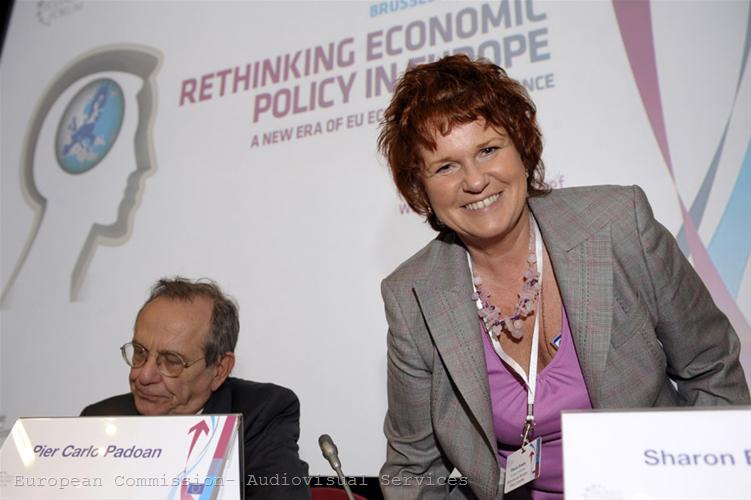Bulgaria is against new taxes on the financial sector
Ralitsa Kovacheva, October 14, 2010
 Taxation of the financial sector was one of the main issues during the informal Council of EU finance ministers in the end of September. And while on the issue of bank levies there was a general consent, things do not look the same with regard to a possible tax on the financial system.
Taxation of the financial sector was one of the main issues during the informal Council of EU finance ministers in the end of September. And while on the issue of bank levies there was a general consent, things do not look the same with regard to a possible tax on the financial system.
A short background
This spring, under the request of the G20, the IMF published a report, proposing taxation on banks with two taxes: a stabilisation fee with a fixated rate which can be collected in a special fund in support of troubled institutions or to get directly in the budget; and a fee on financial activities, calculated on the basis of profit and salaries in the financial institutions, being collected directly in the budget. There is an explicit statement that both fees should apply for all financial institutions not only the banks. Because, otherwise, many of the bank services would be transferred, for example, to hedge funds or insurance in order to avoid taxation.
A month later the European Commission presented a proposal for the creation of a "harmonised resolution framework" in the EU which has been approved by the European Council in June. The Commission proposes the banks to pay a stabilisation tax to be collected in the funds and to be used for the resolution of institutions in trouble, in order to protect the entire system. However, the proposal does not mention neither the rate of the tax nor the basis, on which it will be defined.
Another serious problem is avoiding double taxation which could happen with banks that work in several EU countries, as well as because of the individual decisions undertaken by some countries. These issues will be a subject of another proposal of the Commission, which according to the Taxation EU Commissioner Algirdas Semeta, will be presented recently [it has already been presented].
The current disputes
The European Central Bank supports the Commission's proposal bank taxes to be  channeled into special resolution funds, the president of the ECB Jean-Claude Trichet said after the end of the Council. However, he was against imposing a tax on financial transactions, arguing that such a measure could have a reason only if a global consent is reached, which is not the case now:
channeled into special resolution funds, the president of the ECB Jean-Claude Trichet said after the end of the Council. However, he was against imposing a tax on financial transactions, arguing that such a measure could have a reason only if a global consent is reached, which is not the case now:
"The tax on financial transactions has a lot of weaknesses - economic, financial and such related to the technical implementation, but there is one element which is of utmost importance: it has to be introduced, if that would be decided absolutely everywhere around the world. Otherwise the only result would be a shift of transactions outside the countries that have introduced it".
All discussions so far at a G20 level were unable to produce consensus on the issue. Finding a European solution should be synchronised, on the one hand, with the G20 and especially with the US and, on the other hand - to take into account the various measures some Member States have already undertaken.
In June Britain has introduced a bank levy (to enter into force in 2011), based on financial institutions' liabilities. London's decision was supported by France and Germany who also announced that they were working on introducing bank levies. In a joint statement both countries insisted such a decision to be introduced in the entire EU and the tax to be based on bank balances but to be also in consistence with national specifics.
What is the Bulgarian position on the issue?
In general, according to the Ministry of Finance, both bank levies and the financial sector taxes must be discussed and only after there is clarity on the framework for crisis resolution and the role of the stabilisation funds. (Such a clarity is expected to emerge with the forthcoming proposal of the Commission). With regard to the financial sector tax, the Ministry of Finance says that it is necessary such a tax to be introduced for all financial institutions (banks, non-bank financial institutions, and even investment companies) which undertake credit risks. The rate should also be uniform.
The Bulgarian position is that it would be much more acceptable if the tax is to be defined on the basis of bank institutions liabilities (without taking into account capital and insured deposits), and the rate should not be very high in order to avoid deterioration of economic growth perspectives.
On the issue of financial sector taxes, Bulgaria is "against the introduction of new taxes in the financial sector because it is not expected such a measure to have a positive impact on Member States with an underdeveloped financial sector and, in particular, in the new Member States". According to the finance ministry such a measure would hamper our country in its efforts to develop and strategically position the Bulgarian capital market, as well as the search of solid and respected investors. Bulgaria's position is that before a political decision is to be taken on the issue, a thorough analysis should be made and an assessment of the impact of positive and negative results from a possible introduction of such taxes on Member States' budgets and on financial markets.
 At this stage, Member States' positions are still too different, the Tax Commissioner Algirdas Semeta admitted. At the informal Council two variants for banks taxation were discussed - on financial transactions and financial activities. Without getting into further detail on the forthcoming proposal of the Commission, Semeta said that he had received many new ideas during the debates. He underlined that currently the financial sector is favoured with regard to taxation and that this was a hole that needed to be filled in.
At this stage, Member States' positions are still too different, the Tax Commissioner Algirdas Semeta admitted. At the informal Council two variants for banks taxation were discussed - on financial transactions and financial activities. Without getting into further detail on the forthcoming proposal of the Commission, Semeta said that he had received many new ideas during the debates. He underlined that currently the financial sector is favoured with regard to taxation and that this was a hole that needed to be filled in.
Whatever taxation the Commission would propose, its objectives are the financial sector to have a fair contribution to public finances, to ensure significant revenues without undermining EU's competitiveness and not to create new obstacles for the single market, Semeta underlined. A European approach is necessary and the Commission will come up with a proposal which would be good for Europe, the Commissioner said.
The Belgian Minister of Finance Didier Reynders explained that the issue is a priority for the Belgian EU Presidency and it will try to ensure progress is achieved. First of all, however, EU leaders must agree on a political decision at their Council in the end of October. Only then the discussion on the technical details could start.
The President of the Commission Jose Manuel Barroso stated several times his support for a financial transactions tax as a complement to the stabilisation bank tax. The idea enjoys the support of the European Parliament too. The discussion for or against the tax got new dimensions after the Budget Commissioner Janusz Lewandowski hinted that it was possible financial transactions to become a subject of the first in the Union's history euro-tax as a source of own resources in the European budget. To all questions of journalists whether this was discussed by the financial ministers both Commissioner Semeta and Minister Reynders responded that firstly an agreement in principle must be reached and only then to debate on a possible implementation.
Several days earlier the Greens in the European Parliament presented their proposal for the introduction of a euro-tax on financial transactions, stating that with a rate of 0.05% revenues of 190 bn euro per year will be generated. According to the Greens, initially the tax could be introduced in the euro area only, which would result in 98 bn euro annual revenue in the European budget.
However, it looks as though at this stage the idea is still too controversial. It is  expected, if not a full, at least some clarity on the issue to be available after the European Council in October. Then euinside will be in Brussels to follow the discussions closely. Only one thing is certain at this point, that a more cautious position of EU leaders would meet a fierce criticism from the European Parliament. In November the G20 leaders will meet in Seoul where the EU must have a clear position if it would want to have its partners in the organisation on its side. For now the chances are few, but always political decisions follow financial logic. Sometimes, though, it is quite on the contrary.
expected, if not a full, at least some clarity on the issue to be available after the European Council in October. Then euinside will be in Brussels to follow the discussions closely. Only one thing is certain at this point, that a more cautious position of EU leaders would meet a fierce criticism from the European Parliament. In November the G20 leaders will meet in Seoul where the EU must have a clear position if it would want to have its partners in the organisation on its side. For now the chances are few, but always political decisions follow financial logic. Sometimes, though, it is quite on the contrary.
 | © European Parliament- Audiovisual Unit
| © European Parliament- Audiovisual Unit | © European Parliament- Audiovisual Unit
| © European Parliament- Audiovisual Unit | © European Union
| © European Union | © European Union
| © European Union | © REGIERUNGonline/Bergmann
| © REGIERUNGonline/Bergmann | © European Union
| © European Union | © European Parliament
| © European Parliament | © The Council of the European Union
| © The Council of the European Union | © European Parliament
| © European Parliament